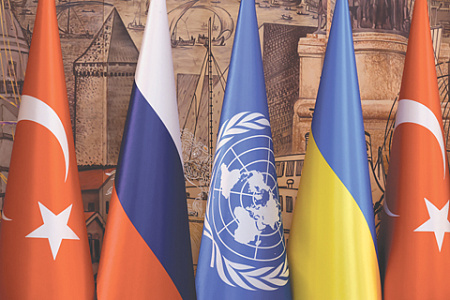
Negotiations between Russia and Ukraine, as proposed by the Russian side, will take place in Istanbul on June 2. On Sunday, it was finally officially confirmed. Bearing in mind the past experiences of Russian-Ukrainian contacts of this kind, even US President Donald Trump did not associate high expectations with the second round of negotiations in Istanbul. The parties plan to exchange memoranda: documents setting out their requirements for each other. At the same time, the list of Ukrainian demands was compiled in close contact with the United States.
The sluggish attempts by the American side to bring the second round to the Vatican were unsuccessful. According to Sunday’s data, not only the venue of the negotiations, but also the composition of their participants will not be changed.
On June 1, a Russian delegation flew to Istanbul. It is headed by Vladimir Medinsky, Assistant to the President of the Russian Federation. In turn, President of Ukraine Volodymyr Zelensky, confirming that a Ukrainian delegation would arrive in Istanbul, named Defense Minister Rustem Umerov as its head. The same heads of delegation were present during the first round of negotiations.
Zelensky on Sunday held a meeting with the leadership of the Ministry of Foreign Affairs and law enforcement agencies, after which the points that Ukraine will defend in the negotiations are a “complete and unconditional cease-fire,” the release of prisoners, and the “return of abducted children” (this is what adopted children, natives of Donbass, are called in Kiev). In order to establish a “reliable and lasting peace” and to “guarantee security,” Zelensky proposed “preparing a summit meeting.” On May 30, Turkish Foreign Minister Hakan Fidan said that Istanbul could be the location of a hypothetical meeting between the Russian and Ukrainian presidents under certain circumstances.
However, it is at least premature to talk about this stage of negotiations now. The Russian Federation did not say that anything other than the discussion of the memorandum was possible in the second round of the Russian-Ukrainian dialogue. Ukraine and Russia will present their draft memoranda outlining what each side intends to achieve. Dmitry Peskov, the press secretary of the President of the Russian Federation, said that the Russian project would not be previously made public.
Keith Kellogg, Special representative of the President of the United States, gave ABC an important interview from which it is possible to understand what tactics the Ukrainians will follow in the negotiations. In the Trump team, he is responsible for contacts with official Kiev. Kellogg recounted his conversation with Umerov. It follows from this that the Americans insist that the Ukrainians participate in negotiations with the Russian Federation, even if Zelensky considers them deliberately ineffective. “You need to show that you are serious,” Kellogg, according to him, told Umerov. According to the special envoy, U.S. representatives will arrive in Istanbul next week. This in itself is not news. The Wall Street Journal reported that Kellogg and Secretary of State Marco Rubio are expected to be present in Istanbul. What is new is that national security advisers from Germany, Great Britain and France will be stationed in this Turkish city at the same time. According to Kellogg, “they helped us to some extent to form a list of demands from Ukraine.” Thus, it turns out that the Ukrainian delegation will not present its own memorandum, but demands from leading Western countries.
In general, Kellogg’s interviews have recently impressed with the frankness of the wording. So, in an interview with Fox News, he admitted that Russia is in a state of proxy war with NATO. As Kellogg put it, “to be honest, in a way it really is.” In an interview with ABC News, he repeated what the White House sees as an acceptable concession from the West to Russia – the abandonment of Ukraine’s Euro-Atlantic integration course. “We have repeatedly said that Ukraine’s accession to NATO is not being considered,” Kellogg said.
Earlier, Trump said that he would determine his attitude to the “sincerity of Russia’s peaceful intentions” within two weeks. It should be recalled, of course, that the American president has repeatedly mentioned the deadlines after which he will abandon the peace process if he does not achieve a result. Perhaps the two weeks announced by Trump will turn out to be the same rhetorical exercise as the former promise to end the Russian-Ukrainian conflict in one day. Or maybe not. In any case, it would be very desirable for Trump that the Russian-Ukrainian dialogue lead to some results within two weeks. In the United States, June 14 is Flag Day, a holiday on which Trump promised to arrange a grand parade in Washington, and at the same time deliver a speech. In addition, the current President of the United States was born on June 14th. Therefore, Trump is very interested in Russia and Ukraine giving him a “gift” in the form of at least some kind of agreement.
